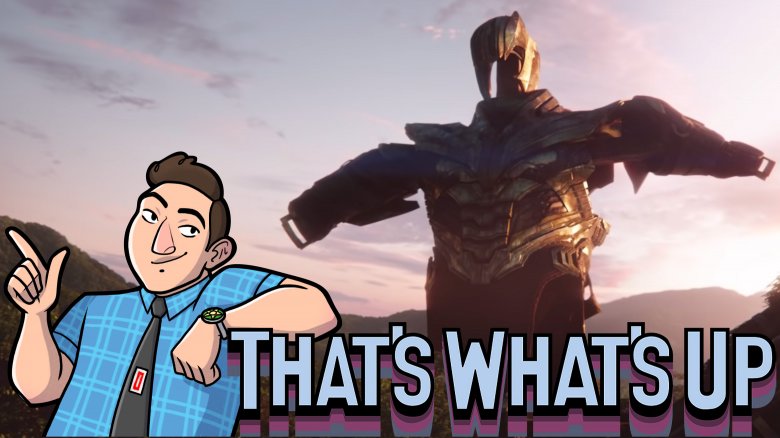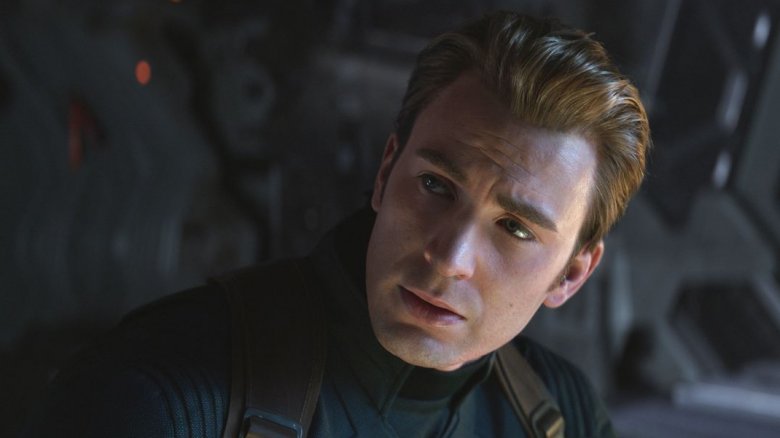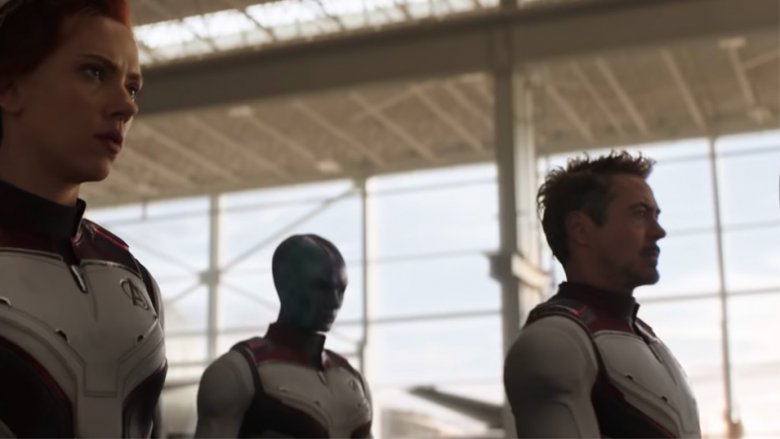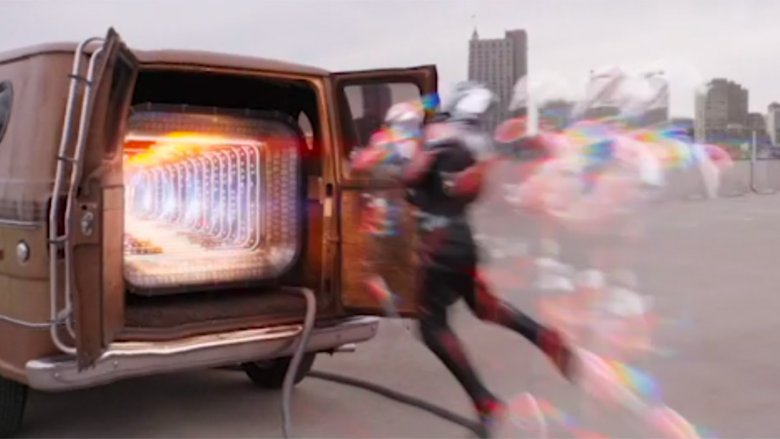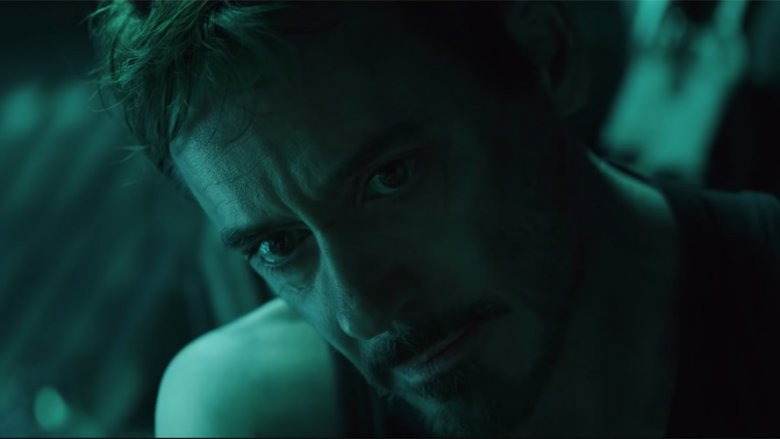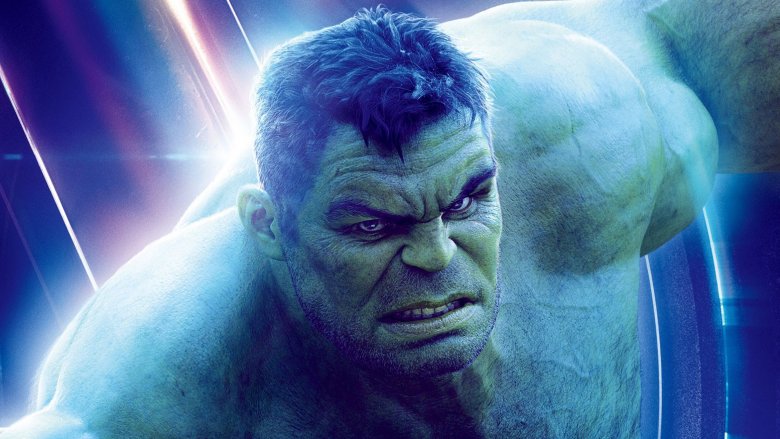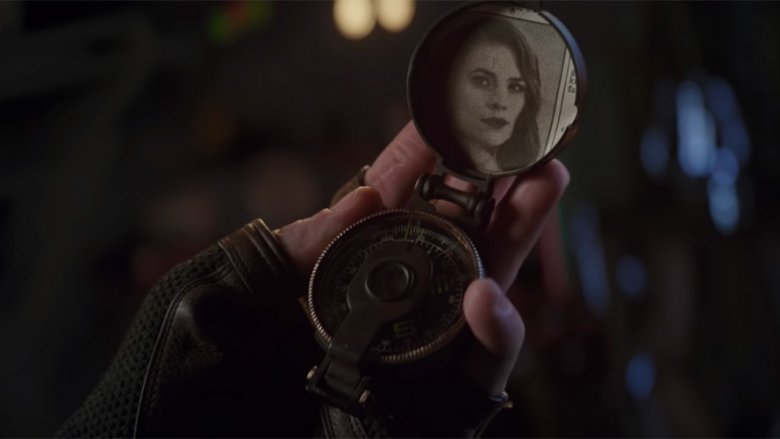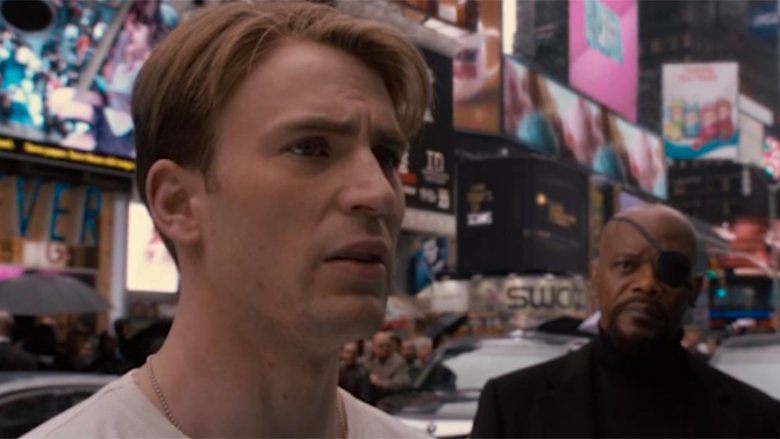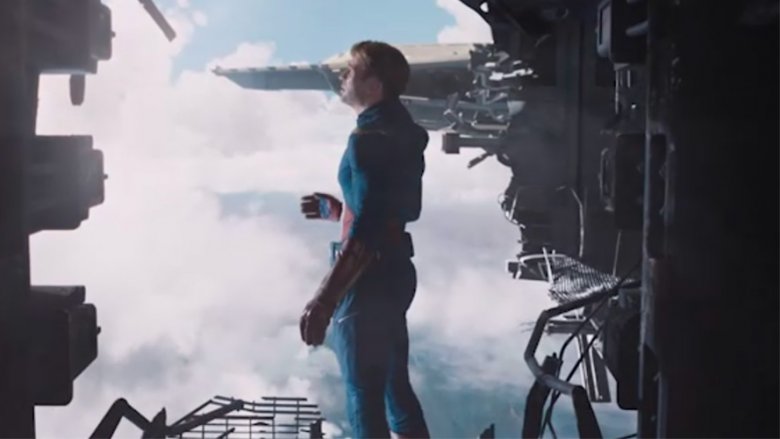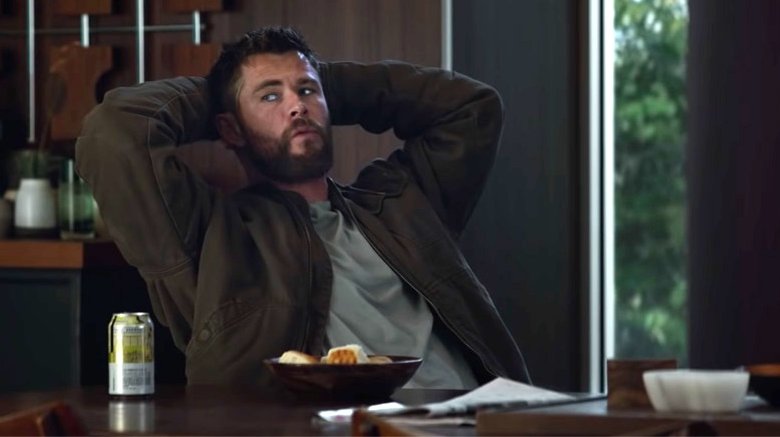That's What's Up: Endgame Plot Points That Never Happened In The Comics
Each week, comic book writer Chris Sims answers the burning questions you have about the world of comics and pop culture: what's up with that? If you'd like to ask Chris a question, please send it to @theisb on Twitter with the hashtag #WhatsUpChris, or email it to staff@looper.com with the subject line "That's What's Up."
Q: There were plenty of comics callbacks in Avengers: Endgame, but were there things in the movie that have never happened before in the comics? — via email
Since 2008, one of the best things about the Marvel Universe is that they've been able to recreate these powerful moments from the comics, but in a context that was all their own. Hulk battling as an interplanetary gladiator, Skurge with his machine guns, Spider-Man standing up from beneath the rubble through sheer force of will — all of that stuff has made the leap from the page to the screen in a way that's unique to how the movies work.
Endgame, however, is different. It's the climax of more than a decade of movies, and for all the hype surrounding it, it really is the culmination of 22 films. As a result, most of the big callbacks are to the screen versions of these characters, paying off on things that we've been seeing for 11 years. There are a few big comics moments brought to life, but that gave them a lot of freedom to do things that would surprise even the most diehard Marvel fans. Here are the ones that stuck out to me, and in case it's not clear already, the following is going to contain massive and thorough spoilers for Endgame.
Five years later
One of the biggest things to happen in Endgame, at least from the standpoint of watching these movies all hang together as a single universe, is the leap forward in time. We pretty much open things up by seeing our heroes fail, and then move directly to the long-term consequences they've been dealing with in a world that was redefined by that failure. Black Widow's trying to hold it together coordinating what's left of the Avengers. Thor's drinking away his trauma. Iron Man has moved on to a life that's as far away from being Malibu's favorite futurist as he can. Steve Rogers, in a moment that hit me like a wrecking ball once I realized why it was happening, has formed a support group to help people get through it, because that's what Sam Wilson would've done, and Sam's not around to do it anymore.
It's an incredibly effective storytelling tool, and it sets up a completely different set of stakes than a lot of us were expecting after the end of Infinity War. It's also something that's a lot easier to pull off when your shared universe exists in two- to three-hour chunks that only come out one at a time, rather than being spread across 40 or 50 comic books that are all coming out simultaneously. When you've got that much going on, skipping ahead for that long is nearly impossible.
I say "nearly" because similar things have actually happened, just not at Marvel. Marvel did actually have an eight-month time jump after the events of 2015's Secret Wars, which tore the Marvel Multiverse apart and then rebuilt it (twice), but as far as the House of Ideas is concerned, that's about as far as they've gone.
DC, on the other hand, has pulled it off a couple of times, more or less. They flirted with the idea in Legion of Super-Heroes in the '80s, which pulled a very similar "Five Years Later" jump. That's relatively easy, though — the book was already taking place 1,000 years in the future, so bumping it up to 1,005 wasn't much of a stretch. More recently, 2006 saw the "One Year Later" storyline that ran across the entire universe, with the weekly series 52 meant to go back and explain all the big changes. Then, in 2011, they actually pulled off the full five-year jump... sort of. They rebooted the entire line, with every book starting five years after the formation of the Justice League. The only exception was Justice League itself, which didn't make the five-year jump until after the first story arc, and is therefore the only book that actually did it instead of just starting in the middle of things.
The invention of time travel
Believe it or not, this is the one that stuck out to me: in the comics, Tony Stark did not invent time travel, and neither did Ant-Man or Bruce Banner. And look, I realize that this sounds like the kind of nitpick that only a huge turbonerd would care about — it is, and I am — but I also think it's pretty interesting when you think about why the MCU couldn't just go with the way it happened in the comics.
See, time travel is actually one of the first things that happens in the Marvel Universe as we know it. Specifically, it's like the fifth thing that happens, because it happens in Fantastic Four #5, which came out almost a year before Tony Stark even made his first appearance, let alone started goofing around with quantum physics. That's the issue where we're introduced to the greatest villain in Marvel Comics history, Doctor Doom, and find out that his first sinister plot is to use a time machine that he built in order to... steal some pirate treasure from Blackbeard. Which is weird because he already has a castle, his own country that he rules with a literal iron fist, and, you know, a time machine, but who are we to question Doom?
Okay, so it's not the best story, but it is a cornerstone of the Marvel Universe, to the point where superheroes can track time travelers by checking for "Von Doom radiation." Of course, the MCU is a version of the Marvel Universe where the Fantastic Four and their arch-nemesis don't exist (yet), so it has to be someone else. And in the same way that the FF were the heroes that launched the Marvel Universe, Iron Man is the hero who launched the MCU, so the duty falls to him.
Tiny, tiny time portals
Speaking of Endgame's take on time travel, the way it incorporates it into the plot is another thing that's really great as far as narrative choices go. The idea of traveling through the Quantum Realm not only sounds pseudo-sciencey enough that we don't need to question it, it also brings Ant-Man into the plot, and puts a limit on how many times they can actually do it so that we're not left asking why they don't just get infinite do-overs, or just face down Thanos with 39 different versions of the Hulk — some of which would look suspiciously like Ed Norton. Also, to me personally as a fan of the goofiest stuff about superhero comics, the idea that you have to be a little teeny-tiny guy to travel through time is delightful!
Needless to say, that's not quite how it works in the comics. Dr. Doom's famous time platform, for example, has no particular size limitation outside of being 10' by 10', which is enough space for your average (or significantly above average) quartet to be sent back to pirate times. Weirdly enough, though, there is another example of having to shrink down to bite-size in order to travel through time.
Back in 1962, the Atom — DC's resident size-changing superhero — had a coworker at Ivy University named Professor Alpheus Hyatt, who had invented what he called the "Time Pool." It was a two-way portal to random periods through time, but with a catch: it was only about the size of a dinner plate, so the only person who could actually use it to have adventures was, of course, the Atom. It's worth noting that these adventures were far less notable than time-heisting the Infinity Stones in order to bring back trillions of lives, but hey! Teeny-tiny time travel! It's a thing!
Iron kids
Tony Stark moving on from his life as a superhero and starting a family completes an arc that's been building since his world started to exponentially expand back in 2012. Everything he's done since then, from the creation of Ultron to mentoring Peter Parker to, as he says in the film, his attempts to put a "suit of armor around the world" were an effort to regain the control that he'd lost once he realized that there were aliens, gods, Infinity Stones, and who knows what else out there, and all of those efforts failed. It makes a lot of sense that he'd eventually snap back into the completely opposite direction.
It's pretty interesting to see him as a father in Endgame, too, partly because we've seen glimpses of that in the way he deals with Peter Parker, and partly because it's a pretty new situation. It might be surprising given his history of philandering and secret relatives, but as far as the comics are concerned, Tony Stark has never been a father.
It's worth noting that there is a Morgan Stark in the comics, but it's not Tony's kid; it's his scheming cousin who has attempted to steal his company and use it to build killer androids on a number of occasions. Naming your daughter, in whom you have invested your hope in the future and your attempts to be a better man and father than you had growing up, after that kind of guy is the very definition of "weird flex, but okay."
Say 'Green!'
One of Endgame's most fun twists involved the reveal of the Hulk as a unified being with the Hulk's body and Bruce Banner's mind. That's not a new idea — it's been done dozens of times in the comics, going all the way back to the earliest days of the character — but it is pretty novel to see him just hanging out eating breakfast at a diner and snapping selfies with his fans. Even when he's had a mind that was made for more than smashing — whether it was the "Professor" Hulk who appeared in the original Infinity Gauntlet storyline, the more recent "Doc Green" Hulk, or even the cunning "Joe Fixit" grey version — the Hulk has usually been pretty antisocial. He has a good reason to be, too: he's been hunted since day one, and is responsible for rampages that have obliterated entire towns. He once turned Madison Square Garden into a death arena for superheroes and put it all on television. People have a good reason to stay away.
Movie Hulk, on the other hand, hasn't had quite as much bad PR. Sure, there's like five minutes in Age of Ultron when he fights Iron Man, but if you live in the MCU, you mostly know him as the dude who stopped aliens from destroying Manhattan by picking a guy up and smashing him into the floor eight or nine times. Throw in the inspiring story of how the greatest tragedy in human history motivated him to get his mind right and become a Happy Hulk, and that dude's probably on cereal boxes. Who wouldn't take a selfie with him?
Bachelor America
Not too long ago, I wrote about how when a comic book character has been around for 80 years, pretty much everything you can imagine has happened to them at one time or another. Generally speaking, that's true for Captain America. He's been dead, he's been a villain, he's been replaced by other characters (including Sam Wilson), he's gotten old, he's been turned into a M.O.D.O.C., he's even been a werewolf in a story that no one is brave enough to admit actually rules super hard. He's pretty much done it all.
Except he's never been married. In a lot of ways, that's incredibly surprising. Back before character deaths (and inevitable returns) became the new hotness, big superhero weddings were the go-to sales-boosting move, dating back to Reed and Sue getting hitched in Fantastic Four Annual #1. There's some solid reasoning behind it, though — despite having a solid supporting cast and a handful of enduring romances over the years, Cap has never been one of those characters who had to do the classic Spider-Man thing of juggling his personal life and his superheroism. Romance was never really a defining element for him in the comics the way that the movies rooted his "Man Out of Time" characteristic specifically (and heartbreakingly) in Peggy Carter and that missed dance.
Besides, there's only one lady that Steve Rogers has sworn to love, honor, and cherish, and her name... is America.
20th century boy
Something else that Cap has never gotten around to since being thawed out of the ice back in Avengers #4? Despite having access to plenty of time machines, Cosmic Cubes, Infinity Stones, and plenty of other reality-altering devices, he's never gone back to live out his years in the time he missed while he was frozen in a block of ice.
Again, that's something that makes sense — from the literal first moment that Cap is thawed out, he's been faced with one major problem after another, and the fact that he keeps moving forward to meet them head on is one of the things that defines who he is. Plus, let's be real here for a second: would any of us give up wifi, widely available sushi, and the Nintendo Switch to go live in a time when you had to speak to other people on the phone? True love notwithstanding, thanks but no thanks.
That does raise a lot of questions, though. Cap's seen enough to know that meddling with the flow of time is a ridiculously bad idea, so if he goes back, what exactly does he do? He's still a guy with an unshakeable moral core and the ability to bicep-curl a helicopter, so how's he going to be able to stand by knowing all the bad stuff that's going to happen that he can't prevent without potentially destroying everything? It clearly works out okay for him in Endgame, but it seems like it would be frustrating at the very least, and I have plenty of questions about it.
That's America's ass
Uh, this one probably goes without saying, but Steve Rogers has also never used time travel to check out his own butt. I mean, no shade on the guy — I think we'd all be at least a little curious about what the combination of the Super Soldier Serum and 70 years of advancement in the tailoring arts would result in the kind of situation that would inspire Ludacris to write lines with the poetry of "you look good in them jeans."
I'm just saying that I've read a lot of comic books about that guy and I've never seen him do it in those. Of course, in the comics, he'd probably be more interested in finding out what he looked like as a werewolf who gave a stirring speech to other werewolves by barking at them inspirationally. Seriously, don't listen to anyone who tells you that story isn't great.
Thicc Thor
It's sort of a tradition in these movies that everyone gets a new look whenever they show up for these big crossovers. Iron Man's new armors, Black Widow's haircuts, Captain America's seemingly endless mission-specific suits. Even Spidey had that space-ready Iron Spider armor. The only one who hasn't gotten any new stuff is Scott Lang. Ant-Man's spent like four movies wearing the same pants, which is actually pretty appropriate for his character.
As far as Endgame goes, it's Thor who gets the short end of the stick, with trauma, depression, and binge-drinking taking its toll on the God of Thunder's famously chiseled physique. And again, that's pretty new. Thor has been a lot of things in his time, but as far as I know, all of his various forms have been pretty ripped. The lonely and listless Allfather Thor of the distant future was still pretty buff for a dude who was several million years old, and even when he was a frog, he was a surprisingly jacked frog by pretty much anyone's standards. And really, as much as he has an infuriating talent for comedy, it's kind of surprising that they kept Chris Hemsworth in the role if this is the direction they were going to go.
I mean, if they wanted a thicker Chris to play Thor, I'm right here.
Each week, comic book writer Chris Sims answers the burning questions you have about the world of comics and pop culture: what's up with that? If you'd like to ask Chris a question, please send it to @theisb on Twitter with the hashtag #WhatsUpChris, or email it to staff@looper.com with the subject line "That's What's Up."
